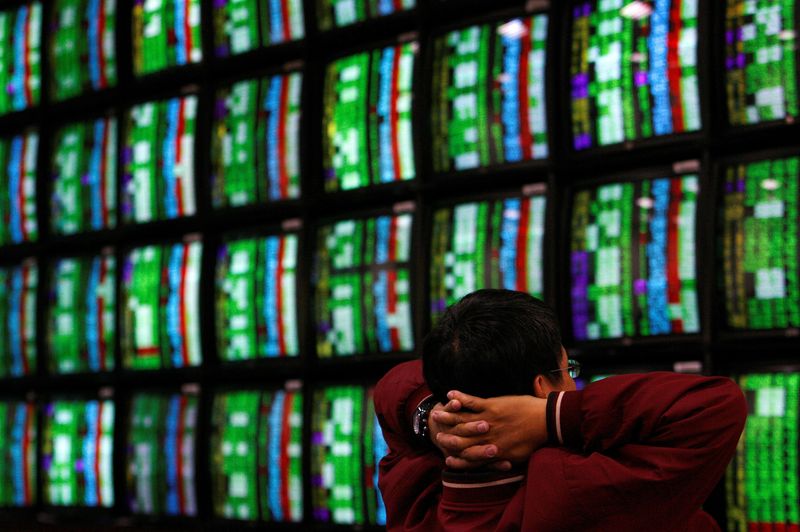By Koh Gui Qing and Saikat Chatterjee
NEW YORK (Reuters) -Global stocks and government bonds plunged again on Monday and the dollar hit two-decade highs, as red-hot U.S. inflation fuelled worries about even more aggressive policy tightening in a big week for central banks.
Underscoring concerns that tighter monetary conditions may cool the U.S. economy to the point of bringing on a recession, the gap between U.S. two- and 10-year Treasury yields inverted on Monday for the first time since April, an occurrence that can herald an economic contraction.
Monday's sell-off pushed the U.S. S&P 500 index - which has dropped over 20% since a recent record close - into a bear market, and came on the heels of Friday's data that showed U.S. inflation accelerating more than expected in May.
The figures unnerved investors and quashed bets that the Federal Reserve was gaining the upper hand in taming soaring prices.
"The Fed said it has got inflation under control. The Fed doesn't have it under control, and they could have lost control," said Ken Polcari, chief market strategist at SlateStone Wealth LLC in Florida.
"I don't see panic selling yet, but it feels like it's coming," Polcari said, adding that a fall below 3,800 points in the S&P 500 index could spur more investors to flee equities.
The Dow Jones Industrial Average tumbled 2.8%, the S&P 500 shed 3.9%, and the Nasdaq Composite plunged 4.7%.
An index of world stocks dropped 3.7%.
As speculation simmers that the Fed could hike interest rates by 75 basis points at its June 14-15 policy meeting this week, markets ratcheted up expectations that U.S. rates would peak at around 4% next year, up an eye-watering 100 basis points from less than two weeks ago.
Investors are trying to predict where benchmark policy rates could peak in the United States and other major economies, as that would help determine equity valuations and how much further share prices could fall.
European shares tumbled 2.4% to their lowest in more than three months, and the euro STOXX volatility index - an equivalent in Europe of the U.S. VIX index, also known as Wall Street's fear gauge - surged to a one-month high. The U.S. Vix index also leapt to its highest in over a month.
Benchmarks in many countries including the Netherlands have suffered declines of more than 20% from a recent closing peak.
"This is happening in spite of the actions that have so far been taken by central banks..., stoking fears that they will have to go harder and faster if inflation is to be tamed, the cost of which is being increasingly seen as lower growth and potentially recession," Equiti Capital chief macro strategist Stuart Cole said.
With inflationary trends showing no signs of abating and new mass COVID-19 testing in China sparking concerns about more crippling lockdowns and squeezed global supply chains, investors cut exposure to risky assets across the board.
Credit default swap spreads blew out to multi-year highs, while cryptocurrencies including Bitcoin and ether posted double-digit losses, as news that U.S. crytocurrency lending company Celsius Network had frozen withdrawals spooked investors.
European bonds were also caught in the broadening debt market selloff following a hawkish European Central Bank meeting last week, with two-year German bond yields galloping above 1% for the first time in more than a decade. [GVD/EUR]
Rising U.S. yields and the flight to safety pushed the dollar index, which measures the value of the greenback against six major currencies, to a high last seen in December 2002. By late afternoon, the index was up 0.7% at 105.18. [USD/]
Against the yen, the dollar retreated from Monday's peak of 135.22 yen, a level not seen since October 1998, while the British pound sank 1.5% after data showed the UK economy unexpectedly shrank in April. [GBP/]
CHINA LOCKDOWNS
This is a big week for central banks with the Fed, Bank of England and Swiss National Bank holding policy meetings.
Expectations of even more aggressive rate hikes from central banks around the world have led investors to sour on the global growth outlook.
Multiple indicators of growth in markets slumped on Monday from technology shares in Hong Kong to the Australian dollar, as investors fled to the perceived safe haven of the U.S. dollar.
Investors in Asia focused on the risk of new coronavirus lockdowns, with Beijing's most populous district of Chaoyang announcing three rounds of mass testing to quell a "ferocious" outbreak that emerged at a bar.
Chinese blue chips fell 1.17% and Hong Kong's Hang Seng suffered a 3.39% slide. Japan's Nikkei slumped 3.01% and South Korea's Kospi shed 3.52%.
"Anyone trying to pick the bottom in China's growth and equity markets on the basis that China was 'one and done' on lockdowns is naive," said Jeffrey Halley, senior market analyst at OANDA.
China's growth shares sagged, with tech giants listed in Hong Kong slumping 4.45%. Index heavyweights Alibaba (NYSE:BABA), Tencent (HK:0700) and Meituan were each down between 4% and 6%.
Leading cryptocurrency bitcoin sank 11.7% to the lowest since December 2020 at $23,462.
Meanwhile, crude oil prices whipsawed between gains and losses, as investors weighed the impact of tight global supplies on softening demand as the world economy cools. For the day, Brent crude futures settled up 0.21% at $122.27 a barrel.
